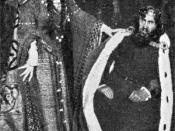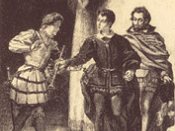Hamlet: Thought versus Action Hamlet throughout the play is known as a man of though. Many times he does not take action, and that ultimately kills him. The inaction displayed is that of his perpentual planning to kill King Claudius. So many times does Hamlet philophosize over what he should do to avenge his father, the kings, death. There are plenty of examples to show his self-pitty and turmoil through-out the play. It is these things that ultimately end up foiling his plot to kill the new king.
Towards the beginning of the play, as Hamlet finds out that his uncle Claudius is marrying his mother, he considers life in general as well as taking his own life. This shows us first that he is a man of thought, because he looks into it deeply and comes out with a reason to live. That reason to live is to avenge his fathers death.
More importantly, Hamlet spends so much time thinking about the murder plot and its effect on the future, that he forgets to look to the future as it is without him affecting it.
Hamlet has an indecisive streak in him. This flaw is the one that allows him to mope about the castle for months on end, without action to avenge King Hamlet's death. Hamlet's indecisiveness kills many people throughout the play. It drives Ophelia mad, kills Gertrude, Polonius, Rosencrantz, Guildenstern, Laerties, and Ophelia. The only problem is that the one he wanted to kill was Claudius, and Claudius eventually killed himself by drinking the poison. But if only Hamlet would have acted desicely, we would have saved seven inocent lives, and taken one guilty one.
Laerties and Hamlet played opposite rolls in the play, but their involvement went very un-noticed. Hamlet was the man...


